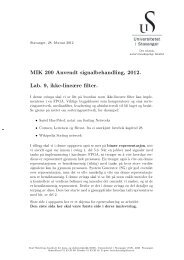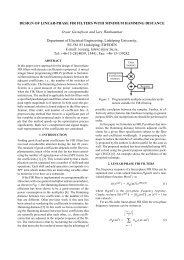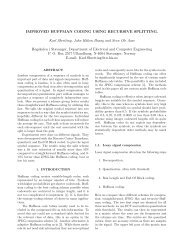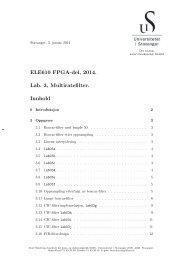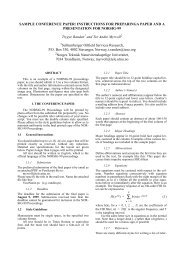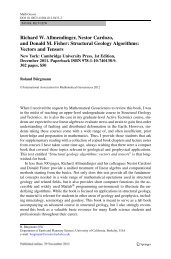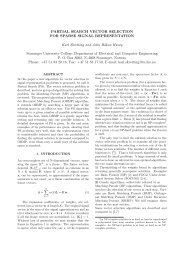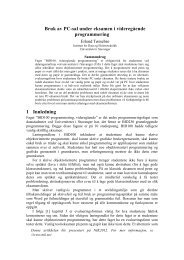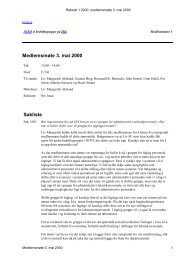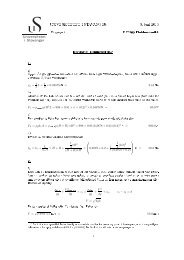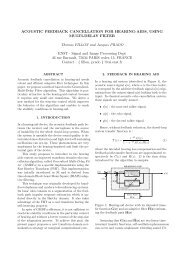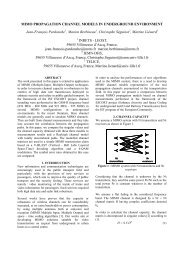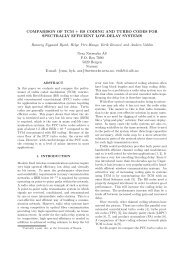PutandL i (t) =P (t) =5∏(t − t i ),i=1P (t) , i = 1, . . . , 5.(t − t i )Then the following three sets of functions are bases for the space E 5 :•••where1, t, t 2 , t 3 , t 4 ,L 1 , L 2 , L 3 , L 4 , L 5 ,T 0 , T 1 , T 2 , T 3 , T 4 ,T 0 (t) = 1, T 1 (t) = t, T r+1 = 2 · t · T r (t) − T r−1 , r = 1, 2, 3 .See [5], page 104.6.1.2 The interpolation problemWe next establish the following result:Theorem 6.1.2 Let n distinct real points t i , and n numbers y i , i = 1, . . . , n begiven. Then there is a unique polynomial Q of degree < n, such thatQ(t i ) = y i , i = 1, . . . , n. (6.1)Proof:Existence of interpolating polynomial Q: Form the sequence of polynomialsaccording toNext putN 1 (t) = 1, N i+1 = (t − t i ) · N i (t), i = 1, . . . , n − 1.Q(t) =n∑c i N i (t).i=1Next determine the coefficients c i such that Q(t i ) = y i , i = 1, . . . , n. We arriveat a linear system of equations of triangular form and the terms on the diagonalare different from 0. Thus this system may be solved, defining an interpolating41
polynomial Q. We next prove uniqueness:Let Q, R be two interpolating polynomials of degree < n Next setS(t) = P (t) − R(t).Thus S is a polynomial of degree < n such thatS(t i ) = 0, i = 1, . . . , n.Thus S is of degree < n having n distinct zeros. This is only possible, if S isidentically 0, establishing uniqueness.•6.1.3 Interpolation formula with remainderTheorem 6.1.3 Let I = [a, b] be a real interval, f be a function defined on Ihaving n continuous derivatives there and let t 1 < t 2 < . . . < t n be n distinctpoints in I. Let also Q be the polynomial of degree < n satisfyingThen we establishQ(t i ) = f(t i ), i = 1, 2, . . . , n.f(x) = Q(x) + K(x)P (x), P (x) =where ξ depends on x.n∏(x − t i ), K(x) = f n (ξ),n!Proof: If x coincides with one of the points t i , it is seen at once that thestatement is true. We treat next the case when x is different from all of thesen points. Let now x be fixed. Then we havei=1f(x) = Q(x) + K(x)P (x), K(x) =Next form the new function F , given byF (t) = f(t) − Q(t) − K(x)P (t).f(x) − Q(x).P (x)We verify that F is 0 at t 1 , . . . , t n , x and hence F has in total n + 1 zeros. ByRolle’s theorem F (n) has a zero at a point which we denote ξ. Differentiating ntimes with respect to t we arrive atF (n) (t) = f (n) (t) − K(x) · n!.Using the fact that F (n) (ξ) = 0 we finally getas claimed.•K(x) = f (n) (ξ),n!Remark 6.1.4 Only in special cases are the higher order derivatives availableas useful formulas, a fact which often causes difficulties in practical situations.42
- Page 1: Lecture NotesCourse ÅMA 190Numeric
- Page 6 and 7: 13.8.4 Inverse linear interpolation
- Page 8 and 9: AbstractNumerical analysts study th
- Page 10 and 11: 1.1.1 Two standard inequalitiesLet
- Page 12 and 13: Example 1.1.3 Examples with s = 3:N
- Page 14 and 15: and the relative condition number b
- Page 16 and 17: This general example may be special
- Page 18 and 19: Theorem 1.5.2 Let A be a square mat
- Page 20 and 21: 1.6.2 Arithmetic sequencen(n − 1)
- Page 22 and 23: 1.6.7 Taylor’s formulaWe derive T
- Page 24 and 25: )c)becauselimx→0x 2e x − 1 −
- Page 26 and 27: 1.7.7 Locating rootsPutShow that th
- Page 28 and 29: We next construct the general solut
- Page 30 and 31: Definition 2.2.1 We distinguish bet
- Page 32 and 33: Example 2.3.5 Consider a computer w
- Page 34 and 35: We now determine c such that 2 + 3c
- Page 36 and 37: e recorded) If there is no such col
- Page 38 and 39: the left hand side and the right ha
- Page 40 and 41: Chapter 4Iterative methods for Ax =
- Page 42 and 43: or, in matrix form with the coeffic
- Page 44 and 45: Chapter 5Least squares fit5.1 Norma
- Page 46 and 47: c 1,4 is the product of the first a
- Page 50 and 51: 6.2 On the choice of nodesIf t i in
- Page 52 and 53: k arguments:f[t i1 , . . . , t ik ]
- Page 54 and 55: Q(x) = 4.6 − 0.8(x + 2) + 0.6x(x
- Page 56 and 57: a relative error bound if x ≠ 0.
- Page 58 and 59: 7.2.2 MultiplicationPutwheres = x 1
- Page 60 and 61: We now assume that f has a continuo
- Page 62 and 63: functional values. Let s ∗ be an
- Page 64 and 65: 7.5.2 Example: additionLetWe then h
- Page 66 and 67: Chapter 8Numerical treatment ofnonl
- Page 68 and 69: 8.3 Determination of approximate ro
- Page 70 and 71: Proof:The case n = 0 is the stateme
- Page 72 and 73: 8.6 The fixed-point methodTo use th
- Page 74 and 75: Chapter 9On approximation offunctio
- Page 76 and 77: 9.1.3 The square rootTo find √ a,
- Page 78 and 79: which is achieved forTo gett i = 1/
- Page 80 and 81: whereF (h, w) = h∞∑n=−∞e iw
- Page 82 and 83: Proof PutThen we haveandM n = supr>
- Page 84 and 85: 10.3 Numerical treatment of rapidly
- Page 86 and 87: n a n−1 s n1 1.00000 1.000002 −
- Page 88 and 89: phenomenon we needDefinition 10.4.1
- Page 90 and 91: a r and b r are given bya r = exp(
- Page 92 and 93: 11.2 Constructing the trapezoidal r
- Page 94 and 95: In the case of (11.2) it is suffici
- Page 96 and 97: should give exact results for all l
- Page 98 and 99:
h=0.2 :f(0) + f(1.6)T (0.2) = 0.2
- Page 100 and 101:
h=0.5 :T (0.5) = 0.5 · f(0) + f(0.
- Page 102 and 103:
A system of ordinary differential e
- Page 104 and 105:
12.3.1 Euler’s methodx r+1 = x r
- Page 106 and 107:
It is directly verified that the so
- Page 108 and 109:
1.00 1.246834041.00 1.246818301.00
- Page 110 and 111:
13.1.3 Stirling’s formula13.1.4 B
- Page 112 and 113:
Power expansions for some elementar
- Page 114 and 115:
TranspositionThenA ∈ R n×m , B =
- Page 116 and 117:
13.5 Least squares solution of line
- Page 118 and 119:
Let f be a function which may be di
- Page 120 and 121:
13.9 Systems of nonlinear equations
- Page 122 and 123:
may be writtenx(t) = x h (t) + x p
- Page 124 and 125:
Chapter 14Laboratory exercises andc
- Page 126 and 127:
Start with x 0 = 1b) Use the bisect
- Page 128 and 129:
14.7 Case studies14.8 Evaluation of
- Page 130 and 131:
n piv,sing nonpiv,sing piv,dbl nonp
- Page 132 and 133:
We put c = 100 + u and solve the pr
- Page 134 and 135:
and hence we may consider minimisin
- Page 136 and 137:
x f(x)−1.0 0.3679−0.5 0.6065 .0
- Page 138 and 139:
14.12 Numerical integration problem
- Page 140 and 141:
14.12.5 Integrand with integrable s



